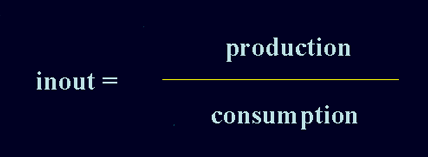| Economics?
Well, many people say that "money makes the world go round". But
these people clearly aren't religionists or scientists! Well,
actually, I guess that really isn't so clear for some strange reasons. I rather like to say that economists are the only people who are allowed to hold theories for which there doesn't need to be any real evidence. Unfortunately, there are many groups that are worse! So I tease the people that purport to do economic forecasts in authoritative ways while relying on us to forget their previous forecasts just about every time they give another forecast. I call their field of study "ecoschlectics" (unfortunately I don't really know any German or yiddish, but I did go to Mashuganah State University often pronounced more like Michiganah State University). I wish these forecasters had to present success measures helping to validate their abilities to predict in the past. But it is more likely to be the case that the only thing they really can predict is the past. Though I must admit that I did have one honest economics professor in my university studies. He was big into statistics and forecasting and working with real data. He was willing to take on all comers with his claims that all of the major macro-economic theories had been disproven by real data. I don't think his confidence about this was ever really tested. This happens when truth is involved far far too often! So I digress as usual! Real Ecoschlectics. So now that I have made my claims to be authoritative about economics entirely clear, I want to present an alternative theory called real ecoschlectics. Let us start by thinking of every individual as both a consumer and a producer in economic exchanges. Let us say that everyone can be characterized by a function that is the ratio of the quantity of their production over their consumption. Let us call this the old inout ratio. For some reason I am reminded of the book and movie "A Clockwork Orange". This is illustrated in the following diagram. |
 |
| Now I know I should be even more scientific and
give this real complicated notation. If you want, I will. But,
at present, this should be a sufficiently sophisticated model of reality. What does it mean when this ratio is less than one?
What does it mean if this ratio is less than one for large groups of people?
So, if this is the case they must be taking from someplace? Where could they be taking from?
Well, I really need to go into this in more depth, but you might see some, all or more than I am getting at. Yes, somebody's getting the old inout put to them. More Ecoschlectics.
Now let's form a similar ratio relating to economic self and other
valuation. This ratio is called the old
inout valuation. It is formed by taking the ratio of what
one would value some other's production at over how much one would value
the same production if they were doing it themselves. |
 |
Now plenty of examples illustrating imbalances in such a ratio are clear and far too easy to come up with. Think of how a wealthy person might value the efforts of their own son to clean their room as compared to how much they would pay someone else to clean it. Or how much they would pay their son to do a particular job and how much they would pay an under-represented person with little or no leverage. A fairly endless variety of other examples are easily generated. But what happens in an ecoschlectic system when large percentages of the "productive" population have such ratios that are significantly less than one?
Personally, I really would like to develop some fairly elaborate simulation models and somewhat more elaborate criteria and interactions. But I know my theories will likely be proven to be bogus by the experts without them even having to consider them! But, regardless, I think many of my goals in developing this are clear. Corruption. How does one define corruption? Possibly a reasonable definition is
I rather like this definition. Though, I am likely to improve upon it. What sort of impact does corruption, as represented by these ratios in aggregation and interaction have on an economy? Maybe the reason the cost of living is so much higher in some parts of the US is because of the extent of corruption in things like the construction industry in these particular regions. Maybe the reason so many more families require two incomes than they did in the not too distant past is because the cost of living has increased in relation to less corrupt generations? Though maybe it is due to increases in taxes? Or maybe the increases in taxes are significantly impacted by increased inefficiencies in bureaucracies? What does real ecoschlectics say? More to come ... as usual ... |